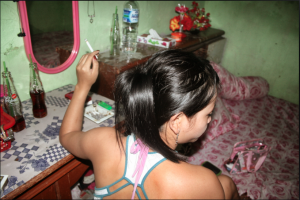by Jia Hui Lee Barisan Nasional component parties, led by Najib Razak, have been warning the rakyat that a regime change in Malaysia could spell social chaos and economic turmoil, as the campaigning period nears Election Day on May 5. Their ads caution Malaysians against voting for the opposition, likening the tumultuous regime changes in the Middle East to what could happen in Malaysia if Barisan Nasional loses what many commentators consider Malaysia’s most definitive general election. “Countries that have been going through Arab Spring, now many people are saying it’s Arab Winter,” Najib, whose party has governed Malaysia for more than half a century, told Bloomberg. “Change,” he adds, “can lead to a disasterous outcome.” The MCA paid for ads in the mainstream newspapers that melodramatically ask “What can we learn from the Egypt, Tunisia, Libya, Yemen, Syria, and Bahrain free fall?” The comparison of Malaysia to Arab Spring countries is grossly inaccurate. For one, the economic circumstances that led to the revolutions, such as high unemployment, are vastly different in Malaysia, where the unemployment rate in February this year is at 3.0%. In Egypt, for example, Sunni Muslims constitute an almost 90% majority, whereas Malaysia’s Muslim majority is just over 60%. Malaysia’s demographics, unlike Egypt’s, will require that political coalitions in Malaysia be ethnically diverse if they are to garner large electoral support. Najib’s warning of an “Arab Winter” in Malaysia if the opposition wins is thus an empty threat. It is just another version of the stock warning that any regime change would bring about a repeat of the 1969 race riots. In fact, if any comparisons can be made, the BN seems to have taken a page from the kingdom of Saudi Arabia. The BN’s strategy of spending billions of ringgit in handouts, wage increases, and subsidies in exchange for political support is similar to the RM112 billion in unemployment benefits and housing subsidies announced by King Abdullah in 2011, an attempt by the King to prevent popular protests in Saudi Arabia. The monarchy feared falling victim to a peoples’ uprisings that have by then toppled governments in Egypt and Tunisia. Similar benefits and handouts were also announced by neighboring kingdoms like Bahrain, whose own monarchy received military assistance from Saudi Arabia to quell protestors who have gathered by the thousands at Pearl Square. These generous handouts, fueled by oil money, along with state repression of protesters, explain why almost all of the oil-rich Gulf monarchies escaped the Arab Spring with little resistance. In Malaysia, Bridget Welsh estimated that Najib has spent close to RM58 billion in election-related incentives since taking office in 2009, an amount that is more than half the benefits announced by Saudi Arabia. About 10% of this RM58 billion is spent on handing out BR1M assistance to lower income households. The rest are spent on salary increases in the public sector, special allocations to development projects, and subsidies to taxi drivers, fisherfolk, and students. Put differently, the BN has spent RM4,363 per voter in an attempt to prolong its 56-year tenure in power, a strategy intended to delay the effects of faulty policies that have forced the costs of living to rise and exploited both foreign and Malaysian workers. No surprise that Malaysia is the third most unequal country in Asia. Najib’s handouts are funded by the government’s revenue, buoyed by generous rents collected from the petroleum and palm oil industry. These industries are estimated to bring in RM150 billion in revenue. They are also responsible for Malaysia’s rapidly ballooning government spending, which has skyrocketed by RM135 billion between 2000 and 2012. BN’s vote-buying is undemocratic. These handouts are calculated as government expenditure, and are not sourced through private fundraising aimed specifically for political campaigning. Thus, Najib is using the rakyat’s money to campaign for his party’s re-election, which gives him an unfair advantage over the opposition. What is even more distressing is that this vote-buying strategy for gaining the rakyat’s mandate undermines the rakyat’s ability to function as actively engaged citizens. Democratic politics is all about seeking input from the people, ensuring that they have an adequate say in how government is run, how it is spending, and how well it is protecting the rights of its citizens. But by handing out cash, subsidies, and salary increases, the BN sends a clear message that it is not interested in the rakyat’s participation in governing the country. What the BN seeks through its billion ringgit vote-buying strategy is a happy complacent rakyat who only cares about how much money she receives from the government without requiring any significant participation in politics. All she has to do is vote BN. Although the 13th General Election is extremely important in determining the future of our country, it is not the only time the rakyat should participate in politics. We should not become political only when there is an election. Democratic politics requires all of us to constantly hold our elected representatives accountable and to shape the direction of policy by lobbying our YBs at all times. A campaigning strategy based on giving out money is one that assumes that the rakyat is selfish and uninterested in politics, who becomes politically active only during an election and when she is able to demand more material gifts. The rakyat should vote for a government which they feel is accountable and responsive to the rakyat’s demands, not for a government which overspends and increases the country’s deficit and public debt, while hoping that the rakyat will leave all decision-making powers to the government. This election, more than others, is the time to show whichever party forms government that the rakyat wants greater participation in the design of Malaysia’s future education policies, economic development, and environmental sustainability. Unlike Saudi Arabia, we have a choice between two major political coalitions, as well as other smaller parties (such as Parti Sosialis Malaysia) and independents. We must not vote for whom we think can guarantee only our material well-being, but for whom we know will require the rakyat’s involvement in the governance of Malaysia.
Jia Hui Lee is currently a student of international relations at the University of Cambridge. He tweets @jhleewrite.
]]>


